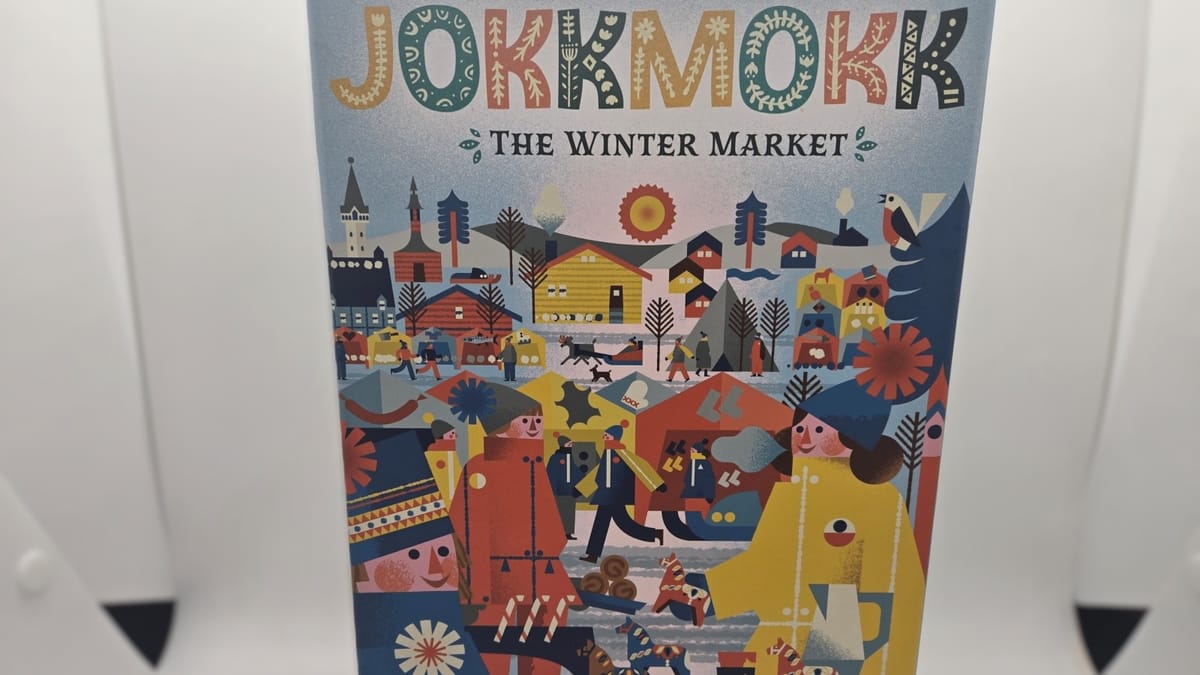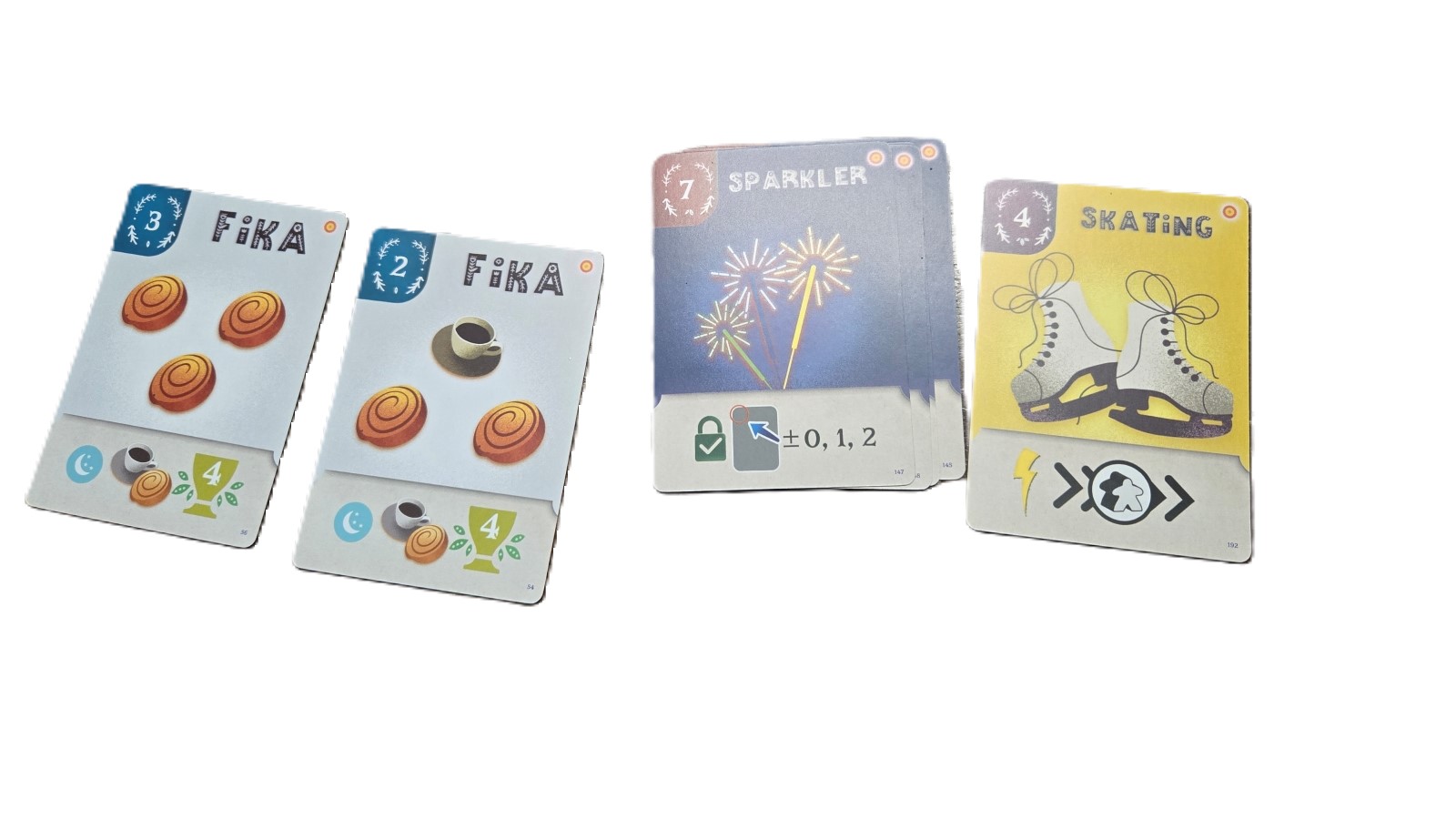
JokkMokk is a 1-5 player card snatchum about kitsch. I don’t mean that in a dour Anton Ego sort of way. I mean that in a Wes Anderson look-at-these-cute-ceramic-doggies-I’ll-take-ten sort of way. With that spirit in mind, the box art goes from “far too busy” to “maybe a little too busy.” Its artist, Christina Hägerfors, deserved a bigger box and a bigger board because its current layout feels like playing Where’s Waldo…except that every detail is Waldo.
Hägerfors used a hard-edged style reminiscent of dalmålning art, which is Swedish. The sets you collect include fika and surströmming, which are Swedish. But after spending 200 words on Jokkmokk market, the Sami people, and silver bells, I realized that I should stop fishing for that particular red herring. Jokkmokk approximates a winter market to some degree (the Oregon Gardens host a lovely one every year that my wife and I attend) and it’s fun to laugh about queue cards holding up your family member meeples, but you have to say goodbye to exotic Sweden. You have to focus on Jokkmokk‘s actual value proposition: a faster and less frustrating way to draft cards.

I like Steampunk Rally and a few other drafting games. They’re perfect on paper. They promise efficiency. They deliver bureaucracy and dysfunction. In your head, you imagine downtime-free games, ballets of pure decision making that you can repeat until you’re full. Same great taste! Half the calories!
In practice, it’s only as fast as its slowest player, and at some tables that player could be (gasp!) you. If you’re quick, you’ll feel like a supervisor waiting on an inexperienced employee. If you’re the plodder, you’ll feel like the employee. Just as you think you’re approaching some sort of relief, your boss drops another hand of cards in your to-do box. “When you’re ready,” they assure you.
The rotation changes. Bedlam ensues. “Who are we passing to again?”
“Do we change directions in this game?”
“Yeah. There’s a chit with an arrow. Ted and George were talking about it.”
“Did we forget to flip the chit?”

“I thought you were looking after the chit, Ted.”
“No, we sorted that, George. Susan offered.”
“What? Don’t drag me into this.”
“Sod the chip. Did we just pass left?”
“Yeah.”
“So pass right.”
Common sense dawns too late to preserve the last ten seconds of our life. Sometimes homo sapiens don’t deserve the name.

Jokkmokk addresses this through a unique approach to the Rochester draft. A Rochester drafting game basically lays out a giant hand of cards on the table and focuses on the opportunity costs behind picking some cards and missing out on others. Since the entire hand’s open information, this makes drafting more competitive and less random. Jokkmokk also improves on the original draft by gradually letting cards trickle into the central pool one at a time. This makes faster, tighter turns possible and eliminates confusion.

Everyone gets two family member meeples. The turn belongs to the owner of the meeple farthest behind (let’s call it the “rearguard” meeple). They move to any card of their choice and collect it. The skater marker advances until it sets behind the new rearguard meeple, replacing unwanted cards and filling the empty spots in between. The rearguard meeple’s player takes their turn, etc. Once the deck depletes, the game ends. Simple as.
Ingeniously, the 18 sets of market cards have different rules for scoring, they sometimes affect movement, and you use six per game. That gives Jokkmokk some serious legs. 18,564 of them, to be exact. That’s 18,564 combinations before you draft from the same set twice. Not all the sets are equally interesting. The ones that award flat points or a bonus for having the most of X material disappoint. I’d toss the dalecarlian horse for more like the patchwork quilt, which is a tile-laying minigame. At the same time, some outperform your expectations. The player who eats the most hot dogs will…forcibly expel half their points, a joke funnier for its understatement and decently interesting to consider.
On top of that, it wraps up in a breezy 45 minutes. The box speaks truth for once! But….

Jokkmokk suffers from excess devotion to a single mechanism that frankly doesn’t deserve the attention, even when the game’s this light. Drafting and deckbuilding seem to work better as connective tissue for other, more robust mechanisms. On their own, they lack the vigor to generate larger contexts and more impactful decisions. They end up stuck on the same type of decision ad nauseam. Granted, Jokkmokk’s a cut above other pure drafters like Sushi Go or 7 Wonders: Architects, so I can heartily recommend it to those who don’t find the observation above to be accurate.
Jokkmokk suffers from a distinct lack of identity, which is harder to cure, harder to articulate, and more unfortunate in today’s packed bazaar. It’s interesting to go from Zhenguo, a lengthy experience greater than the sum of its parts, to Jokkmokk, a family crowd-pleaser that feels somewhat underbred. Its modularity, its levity, and its well-oiled answers to drafting’s squeakiest wheels run so smoothly that it runs thin. Thin conceits can puree 18,564 exciting combinations until they’re a bland, Very Impressive Number.
It seems cruel to punish a game based on something so ephemeral as “character.” Why should it fail in my books where the clunkier, more ungainly Elysium succeeded? But in the end, a review’s about impressions. Jokkmokk’s tasseled boots never even broke snow.
Jokkmokk: The Winter Market
Below Average
Jokkmokk: The Winter Market has some clever ideas about drafting that don't manage to cohere into a bigger thought.
Pros
- Pleasant amblin' atmosphere.
- Neat mechanisms for longstanding card drafting inconveniences.
- Tons of replay value.
Cons
- "Honey, I shrunk the board."
- Forgettable.
- I forgot already.
